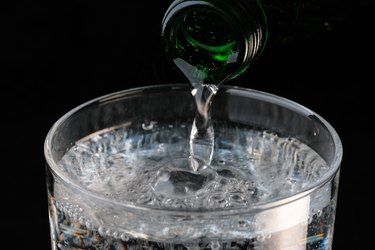
If you have irritable bowel syndrome (IBS) and are a fan of carbonated drinks like sparkling water and soda, you may be wondering how the bubbles might affect your IBS symptoms and gut health. Before you pop open your next drink, here's the science on fizzy drinks and IBS.
Read more: 11 Foods to Avoid When You Have IBS
Video of the Day
Video of the Day
The IBS Basics
If you experience the chronic belly pain, bloating, constipation and diarrhea associated with IBS and are still a bit confused about the condition, you are not alone. According to Johns Hopkins Medicine, the condition usually begins before the age of 40 and affects up to 15 percent of the U.S. population. It affects twice as many women as men.
While the syndrome is not fully understood, Johns Hopkins Medicine notes that recent research shows that numerous symptoms are linked to hypersensitivity in the nerves of the wall of the GI tract, which are separate from, but communicate with, the nerves in your brain and spinal cord.
Ultimately, explains New York City-based gastroenterologist Elena Ivanina, DO, of Lenox Hill Hospital, "IBS is actually a very complicated condition with many contributing mechanisms," including:
- Abnormal motility.
- Gut hypersensitivity.
- Food intolerance.
- Dysbiosis (abnormal microbiome composition).
- Bile acid dysregulation.
- Low-grade inflammation.
- Gut-brain axis hyperactivity.
- Genetic factors.
The Effervescent Truth
According to Kaiser Permanente, many people report that eating causes unpleasant IBS symptoms, including bloating, constipation or diarrhea (or a combo of the two) and stomach pain. So if you have IBS, you no doubt want to avoid any potential triggers — like carbonated beverages, for example.
While the connection between what you put in your mouth and your IBS is not fully understood, according to the NCH Healthcare System, certain foods and drinks can trigger your symptoms, including:
- Carbonated drinks.
- Dairy products and milk.
- Beans.
- Wheat.
- Cabbage.
- Citrus fruits.
So what about those bubbles? "Drinking carbonated beverages does not cause IBS and/or diarrhea, but it can certainly be a trigger for bloating and gas," Dr. Ivanina says. "It makes sense as you are literally drinking gas bubbles," she adds. And "when carbonated beverages, such as sodas or diet sodas, contain sugar or artificial sweeteners, then it is more likely they will cause diarrhea."
Making the Cut
If you want to minimize IBS symptoms, Kaiser Permanente suggests playing it safe when it comes to potential dietary offenders. For example, Kaiser recommends limiting or altogether eliminating anything that can make bloating, gas and diarrhea worse, including:
- Alcohol.
- Caffeine (coffee, tea).
- Milk products.
- Fatty foods.
- Foods high in sugar.
- Veggies that cause gas (broccoli, cabbage, beans and more).
- High-fructose foods (fresh fruit and fruit juice).
- Artificial sweeteners xylitol and sorbitol (which are often used in sugarless candy and sugarless gum).
And — you guessed it — those fizzy, carbonated drinks. Kaiser adds these specific foods as potential offenders:
- Cabbage.
- Onions.
- Peas and beans.
- Hot spices.
- Deep-fried and fried food.
- Pizza.
- Coffee.
- Cream.
- Smoked food.
To know which beverages and bites personally upset your IBS symptoms, Kaiser suggests keeping a daily diary of what you are eating and drinking and any unpleasant symptoms that result. To otherwise mitigate symptoms, Kaiser recommends eating slowly, consuming your meals in an environment that is quiet and relaxing and not skipping any meals.
And, depending on your personal IBS symptoms (whether you lean more toward diarrhea versus constipation), fiber can be your friend or foe. If you tend to have urgent, loose stools — and especially a lot of gas and bloating — try reducing your high-fiber food intake, such as brown rice, high-fiber cereals and vegetables, Kaiser suggests. And if you experience IBS-related constipation, Kaiser advises actually adding fiber to your diet and drinking plenty of water.
FODMAPs for the Win
Beyond what to avoid, if you're looking for an ideal diet to follow to keep your symptoms in check, Dr. Ivanina says the best studied diet for IBS, especially IBS with diarrhea, is the low-FODMAP diet. "FODMAPs are carbohydrates including fermentable oligosaccharides, disaccharides, monosaccharides and polyols," she says.
"For example, lactose and galacto-oligosaccharides (GOS) such as beans are eliminated as part of this diet," she adds. "The low-FODMAP diet has shown great efficacy in clinical trials with over 70 percent of IBS patients having a significant improvement in symptoms."
Read more: Your Ultimate Guide to Living Well With IBS
- Johns Hopkins Medicine: “Irritable Bowel Syndrome (IBS)”
- NCH Healthcare System: “Diseases and Conditions: Irritable Bowel Syndrome”
- Elena Ivanina, DO, triple board-certified gastroenterologist, Lenox Hill Hospital, New York City
- Kaiser Permanente: “Irritable Bowel Syndrome: Controlling Symptoms With Diet”
Is this an emergency? If you are experiencing serious medical symptoms, please see the National Library of Medicine’s list of signs you need emergency medical attention or call 911.